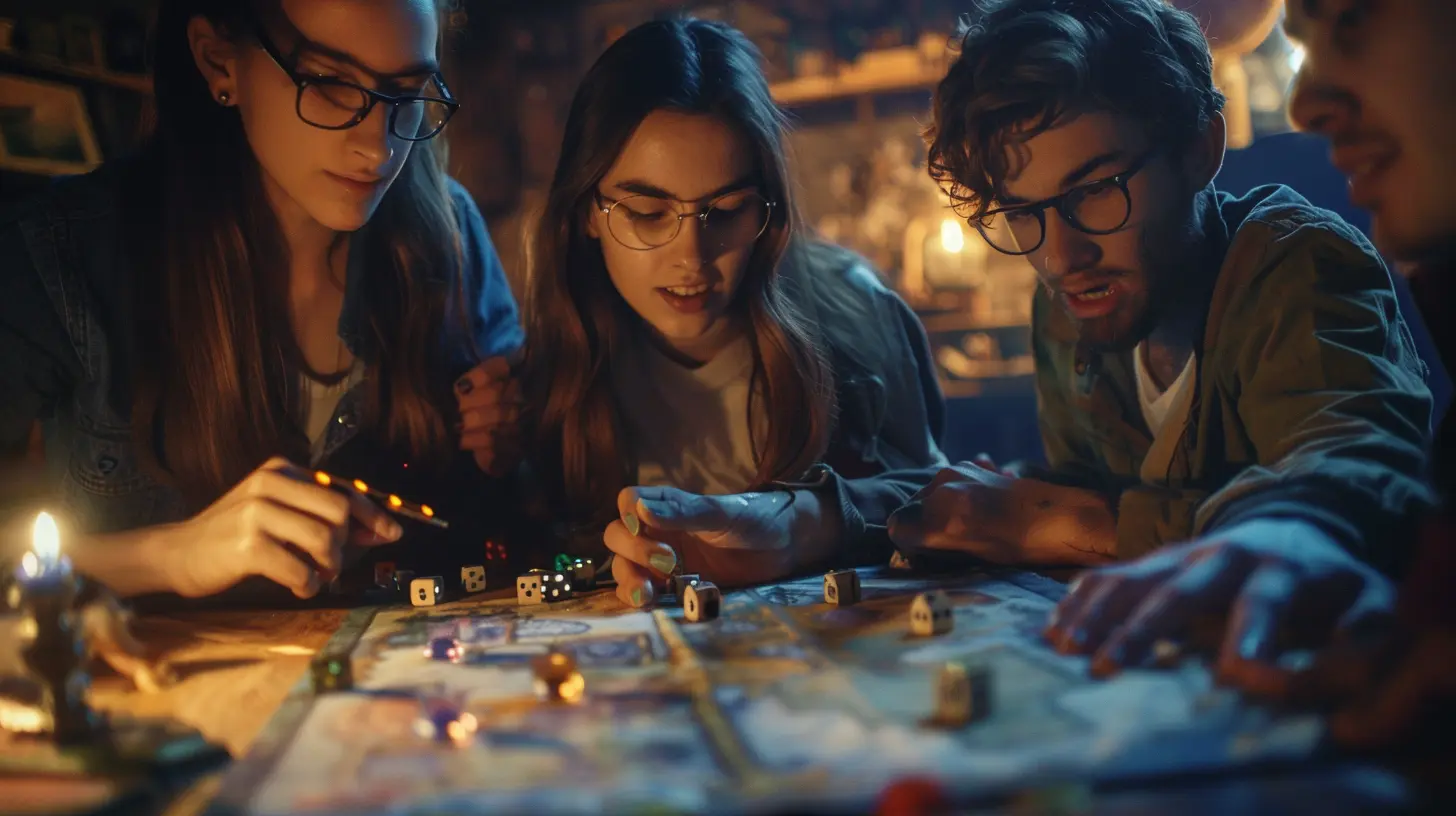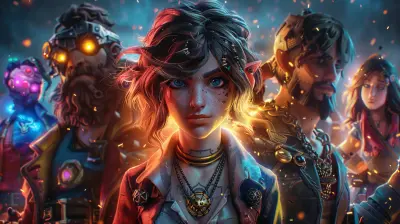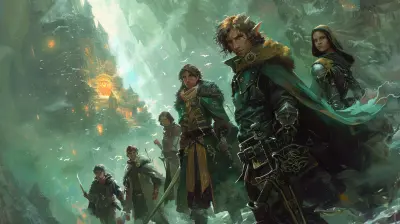How Social Games Can Teach Valuable Life Lessons in Fun Ways
31 May 2025
Let’s be honest—when you think of social games, your first thought probably isn’t life lessons. Most of us see them as a way to kill time, bond with friends, or maybe even procrastinate (#guilty). But what if I told you that these games, the ones we laugh over, obsess over, and sometimes rage-quit, are secretly little pockets of life wisdom? Yup, social games like Among Us, Fortnite, or even Words With Friends can sneakily teach you valuable life lessons, all while you’re having a blast. Surprised? Let’s dive into the world of social games and uncover how they can shape who we are—without us even realizing it.

What Are Social Games, Anyway?
Before we get into the juicy stuff, let’s break it down. Social games are multiplayer games that focus on interaction between players. Think games like Animal Crossing, Minecraft, or Mario Kart. They’re often easy to pick up and play, making them super accessible for gamers of all skill levels.What sets them apart is their emphasis on—well—socializing. Whether you're teaming up with friends to crush the competition or shouting “sus” during an Among Us round, these games are all about connecting with others. And let’s face it: we all need a little more connection in our lives, right?
Now, let’s see how those connections translate into some surprisingly profound lessons.
1. Teamwork: The Magic of Collaboration
Think back to the last time you played a co-op game. Maybe you were running heists in GTA Online or building epic structures in Fortnite. What did you have to do to win? Work together.Social games thrive on teamwork. They force you to communicate, trust your teammates, and divide responsibilities. This isn’t just gaming; it’s a crash course in collaboration.
Here’s the kicker: the same skills you use to win a Battle Royale are also crucial in real life. Whether you’re working on a group project at school or collaborating with coworkers, knowing how to effectively team up is a game-changer. Social games teach you that everyone has their own strengths. Just like your buddy excels at sniping while you dominate close combat, people in real life bring different skills to the table—and success lies in playing to those strengths.
2. Problem-Solving: Thinking on Your Feet
Ever been in a high-stakes situation in a game where quick thinking was the only way out? Like when you’re the last crewmate in Among Us trying to figure out who the impostor is? Social games constantly throw challenges your way, and you have to adapt fast.This isn’t just fun; it’s training your brain to solve problems under pressure. You learn to assess situations, weigh your options, and make decisions—even when the clock is ticking. That’s a skill you can take straight into your real life, whether you’re navigating a tricky workplace problem or figuring out how to fix a busted faucet at home. Who knew gaming could turn you into MacGyver?
3. Patience and Resilience: Bouncing Back from Losses
Let’s be real—losing sucks. Whether it’s getting eliminated first in a Fall Guys round or being the first to go bankrupt in Monopoly, nobody likes to fail. But guess what? Social games teach you to lose gracefully.Think about it. Every time you lose, you learn something: what went wrong, how to improve, or even just how to laugh it off. Over time, you build resilience. You stop seeing failure as the end of the world and start treating it as a stepping stone to your next win.
In life, setbacks are inevitable. But if you’ve raged over enough Mario Kart blue shells, you know how to take losses in stride and keep going. It’s a life lesson wrapped in frustration and fun.
4. Empathy: Walking in Someone Else’s Shoes
Have you ever played a role-playing game and felt emotionally invested in your character or the choices you made? Games like The Sims or Stardew Valley allow you to experience different perspectives and learn how your actions affect others.Social games, especially, are great at fostering empathy. When you’re negotiating alliances in Risk or trying to convince others of your innocence in Mafia, you learn to read people—emotions, motives, and body language. This ability to empathize and understand where others are coming from is a skill that translates directly to real-world relationships.
Plus, games can put you in scenarios you might never face in real life. They challenge you to think about decisions from various angles, helping you become more considerate and emotionally intelligent. Not bad for something you downloaded on a whim, huh?
5. Leadership: Stepping Up When It Matters
Ever had to lead your squad in Apex Legends to victory? Or maybe you’ve been the one organizing resources in Minecraft so your group can survive the night. Social games often give players the opportunity to step into leadership roles—and that’s huge.Leadership in games isn’t just about calling the shots; it’s about motivating others, making strategic decisions, and sometimes even sacrificing your own win for the greater good. These are real-world leadership skills in disguise.
The next time you’re tasked with leading a team meeting or managing a group project, you might just find yourself channeling your inner Captain Levi (Attack on Titan, anyone?).
6. Time Management: Balancing Fun and Focus
If you’ve ever managed a virtual farm in FarmVille or kept your island thriving in Animal Crossing, you know time management is key. Crops won’t wait, and neither will Tom Nook’s endless demands!Social games often require players to juggle multiple tasks within limited timeframes. And while that may seem trivial, it’s actually teaching you how to prioritize. You learn to focus on what’s important, plan ahead, and stay organized—even while chaos (or a time limit) looms over you.
Time management is a valuable skill in life, whether you’re balancing work and personal commitments or just figuring out how to get through your never-ending to-do list. Thanks, Stardew Valley, for making adulting just a tad easier.
7. Negotiation: The Art of Persuasion
Every social game has its moments of negotiation—whether you're bartering for resources in Catan or trying to convince players in Among Us that you're not the impostor. These scenarios teach you the art of persuasion.You learn how to build trust, spot when someone’s bluffing, and make deals that benefit both parties. It’s like a masterclass in social psychology disguised as game night.
In real life, negotiation is everywhere. Whether you're asking for a raise, buying a car, or deciding where to eat with friends, the skills you hone in social games will come in handy. Who knew hours of Among Us arguments could prep you for the boardroom?
8. Creativity: Thinking Outside the Box
Social games often encourage players to think creatively. Whether you’re designing a dream home in The Sims or finding unconventional ways to win in Cards Against Humanity, these games spark your imagination.Creativity isn’t just about being artsy; it’s about thinking outside the box and finding innovative solutions to problems. By engaging in social games, you’re subtly training your brain to approach challenges in new and inventive ways.
This type of creative thinking is an asset in any field, from marketing to engineering to—yes—even parenting (because let’s face it, kids are basically tiny bosses with impossible demands).
9. Building Relationships: The Power of Connection
Social games are, at their core, about connecting with others. Whether you’re competing, cooperating, or just trash-talking your friends during a game of UNO, you’re strengthening your relationships.Shared hobbies—like gaming—bring people closer together. And while bonding over a game may seem trivial, it’s these small moments of connection that build lasting friendships. Plus, social games make it easy to meet new people! You never know when that random teammate in Valorant might turn into a lifelong friend.
10. Stress Relief: The Importance of Having Fun
Okay, this one might seem obvious, but let’s give it the credit it deserves. Social games remind us of the importance of fun. In an overly busy, stress-filled world, taking a break to laugh, play, and unwind is essential for your mental health.And yeah, while some moments (looking at you, Dark Souls) can feel stressful, the overall experience of playing games with others is a fantastic way to recharge. It’s a reminder that life isn’t just about achieving goals—it’s about enjoying the ride.
Final Thoughts: More Than Just Play
So there you have it—social games aren’t just a way to pass time; they’re a treasure trove of life lessons. From teamwork and leadership to resilience and creativity, these games teach us skills we’ll carry long after we’ve logged off. And the best part? They do it in the most fun and engaging way possible.So the next time someone gives you a hard time about your gaming habits, hit them with this: “I’m not just playing games, I’m leveling up in life!” (Mic drop.
all images in this post were generated using AI tools
Category:
Social GamesAuthor:

Kaitlyn Pace
Discussion
rate this article
3 comments
Zinna Harper
This article beautifully highlights the unique ability of social games to impart essential life lessons while keeping the experience enjoyable. It's fascinating how play can facilitate teamwork, communication, and problem-solving skills. Thank you for shedding light on this intriguing intersection of fun and personal development—it's a perspective worth exploring further!
June 13, 2025 at 3:29 AM

Kaitlyn Pace
Thank you for your insightful comment! I'm glad you enjoyed the exploration of how social games can enhance teamwork and personal development while keeping the fun alive.
Zevran McGuire
Social games: where teamwork meets strategy, teaching us life’s lessons one virtual challenge at a time. Let’s play smart!
May 31, 2025 at 3:15 PM

Kaitlyn Pace
Thank you! Social games truly provide a unique platform for learning teamwork and strategy while having fun. Let’s keep playing and growing together!
Corin Cummings
Great article! It's inspiring to see how social games can provide valuable life lessons while keeping us entertained. They foster teamwork, communication, and problem-solving skills in an engaging way. Embracing these experiences can truly enrich our lives—both in-game and beyond! Keep up the great work!
May 31, 2025 at 2:20 AM

Kaitlyn Pace
Thank you! I'm glad you found it inspiring. Social games really do have a unique way of teaching important life skills while keeping us engaged. Your feedback means a lot!



